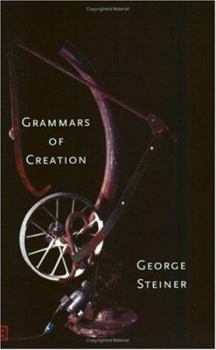Grammars of Creation
Select Format
Select Condition 
Book Overview
"We have no more beginnings," George Steiner begins in this, his most radical book to date. A far-reaching exploration of the idea of creation in Western thought, literature, religion, and history, this volume can fairly be called a magnum opus. He reflects on the different ways we have of talking about beginnings, on the "core-tiredness" that pervades our end-of-the-millennium spirit, and on the changing grammar of our discussions about the end of...
Format:Paperback
Language:English
ISBN:0300097298
ISBN13:9780300097290
Release Date:September 2002
Publisher:Yale University Press
Length:350 Pages
Weight:0.90 lbs.
Dimensions:0.9" x 5.0" x 7.7"
Customer Reviews
2 ratings
Steiner and the "barbarism of specialization"
Published by Thriftbooks.com User , 18 years ago
It seems to me that George Steiner is a sworn enemy of what Ortega (disparagingly) called the "barabarism of specialization." Although one may quibble that his work exhibits a lack of the "rigor" (as one reviewer put it) that comes with specialized knowledge, I submit the following thesis, which is certainly contestable: Mr. Steiner's lack of "rigor" is the precise point of its work and its value. I, for one, believe that just as one not need be schooled in literary theory to appreciate and understand literature, so one need not vex oneself in the labyrinthine specifics of analytic philosophy to understand philosophical concepts. Mr. Steiner is "un hombre de las letras," in the precise sense that Ortega meant (lest I annoy the reviewer who complained of untranslated text in Steiner, that's Spanish for a "man of letters"). It is of greater concern to me that there are not more Steiner's in our barbarously specialized age, than that the Steiner we have might overlook a few details. Man, whose science has classified himself "homo sapiens," which we render as the "thinking being," has lost the ability to see things in their totality, i.e. to think. Gone is the age of the synoptic genius. Or so it would seem. But man is still man, and modern man labors under the curse of skepticism and scientism that he pronounced upon himself. Speculation is, or was until recently, a legitimate and enviable philosophical gift. Steiner has the gift in spades. If George Steiner troubles and challenges readers who have not his classical erudition, I say that he has done his job. If Steiner irks the rank and vulgar skepticism of those schooled in the horrifically delimited contours of empirical science, I say good. If Steiner manages to get even a single reader to think outside the conceptual categories of a debased and debasing materialist metaphysics, I say, "Amen." Grammars of Creation is Steiner's best work. It says more about more than anything else he has written. If he is right, that it is "closing time in the gardens of the West," the fact that he is not appreciated by the American reading public is, in my mind, proof of it. I close by saying that he is proof to me that it is still possible, in an age of stultifying scientific tunnel-vision, to think.
An Elegant Eulogy
Published by Thriftbooks.com User , 22 years ago
Steiner has written a difficult and rewarding book on the modes of creation. Based on a doctoral seminar in Comparative Literature and Poetics, it calls for a reader appreciative of the broad spectrum of arts and European literature . What are the structures and sources of creation in philosophy, literature, painting, sculpture, music, architecture, mathematics and science? How do these structures relate to each other? How has the twentieth century transformed these grammars? Steiner explores these questions, guided by the classics(Commedia, Book of Job) and the voices of seminal figures(Goethe, Shakespeare, Wittgenstein). Steiner concludes, " the story out of Genesis has ended". Duchamp and the Dada movement mark the end of creation once driven by theological impulses, fears of mortality, and desire for artistic permanence. The twentieth century has seen the exponential ascent of science and technology. Discovery and invention have emerged as the dominant grammars of human expression. As an engineer, I appreciate Steiner's reflections on the creative aspects of science. Although I am not convinced about his conclusions , I still find the arguments engaging and the style entertaining enough to reread the text now and then.





